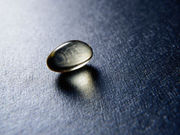No reduction in disease at age 6 years; protective effect suggested on D. farinae sensitization
THURSDAY, May 26, 2016 (HealthDay News) — Prenatal supplementation with omega-3 (n-3) long-chain polyunsaturated fatty acids (LCPUFA) does not reduce immunoglobulin E (IgE)-associated allergic disease in children, according to a study published online May 25 in Pediatrics.
Karen P. Best, R.N., Ph.D., from the South Australian Health and Medical Research Institute in Adelaide, and colleagues assessed 706 children with a family history of allergic disease from the Docosahexaenoic Acid to Optimize Mother Infant Outcome trial at six-year follow-up. Women enrolled in the trial were randomized to n-3 LCPUFA-rich fish oil capsules or vegetable oil capsules.
The researchers found that the percentage of children with any IgE-associated allergic disease did not differ between the n-3 LCPUFA and control groups (31.5 versus 31.5 percent; adjusted relative risk, 1.04; 95 percent confidence interval, 0.82 to 1.33). The percentage of children sensitized to house dust mite Dermatophagoides farinae was reduced in the n-3 LCPUFA group (13.4 versus 20.3 percent; adjusted relative risk, 0.67; 95 percent confidence interval, 0.44 to 1.00).
“Prenatal n-3 LCPUFA supplementation did not reduce IgE-associated allergic disease at 6 years of age,” the authors write. “Secondary outcomes were suggestive of a protective effect of the intervention on the incidence of D. farinae sensitization.”
Two authors disclosed financial ties to the nutrition industry; one author has a patent pending.
Full Text (subscription or payment may be required)
Copyright © 2016 HealthDay. All rights reserved.








